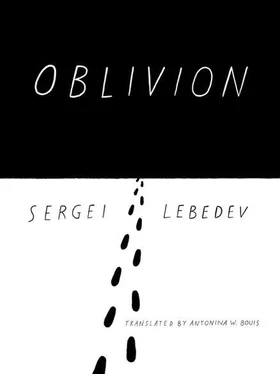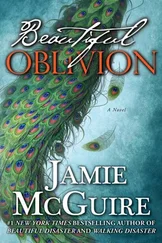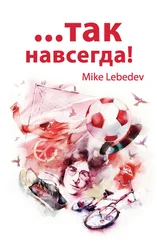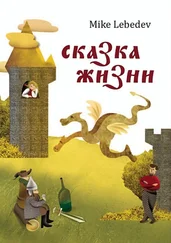Nature’s white is blind, it has no depth or perspective as does black, for instance; white in the North is the profound color of nonexistence, the color of death, a color wall that removes the distinctions of closer and farther, and locks a person inside it. The world turns into a sphere without horizon, and eyes ache because while seeing they do not see, there is nothing to see except the color white, which drives you insane with its stolidity, its indivisibility into shades, its thing-like solidness—it feels as if you could tear it apart with your hands, chop it with an ax. You fall into a coloristic trance, into monotonous color madness; whiteness enters the visual nerve as a blinding injection, and only the emptiness of white remains, smooth and scorching.
In two days, Grandfather II went blind: the tundra took away his eyes. He was found by men sent from the village he was traveling to, they found him by accident: one of the men in the truck was a soldier of the “flying” squads that went out to catch fugitives; a lot of people tried escaping over the spring snow crust, and the soldier knew how to look and still protect his eyes from the sun and ice—through smoked glass; and through the smoked glass he saw a dark dot far from the road in a long declivity; if he had just been looking with his naked eye, even with his hand shading his eyes, the black dot would have been swallowed and dissolved by the glare.
Grandfather II almost died; he dared to test death on others and was thrown into it himself; he was pulled out, as if by his umbilical cord, by the sharp eyes of the searcher, but he paid for his salvation with blindness. His vision returned slightly, he nearly overcame the weakness, but then he lost his sight completely.
Now I knew what he always saw before him, the last thing his memory had retained—the color white; he tried to trick fate by inscribing characters upon the blank background; get back his son, and his vision would return, his past, too, and the years he did not see would vanish, as if they had never been.
Istill had to go to the river and find the exiles’ island—I had to travel the entire trajectory of Grandfather II’s fate; I felt that there, in that nook that even he did not know fully, was a limit; I called it the limit of oblivion.
I was stepping into a space where there were no witnesses. The island mentioned by the engraver was a point—a pulsating point where everything begins and where everything ends.
Bidding the engraver farewell, I left the town; I needed to hurry, as if a deadline loomed; I remembered my dream, the island of faces, the barge with prisoners and convoy guards, the closing doors of the holds; the time for wandering was coming to a close for me, the town was pushing me onto the road. The inner state I had maintained since the decision to learn everything about Grandfather II’s past was also running out; if you understand “inner state” to mean a readiness for perception, a lasting effort to be open to events, it also has a time limit which should not overstepped, otherwise, it’s all artificial respiration, self-inducement, and naked dutifulness.
I did not think about how I would return; the thought of returning would have turned my search for the island into a round-trip. But you couldn’t reach the island and then come back the same way—that contradicted its finality, the point’s absoluteness.
I headed to the river along the roadbed of the former railroad; I turned off at times, climbing up on the hills to look around: the gravel bed was low and offered no view. The landscape was the work of a demented soul, continually repeating the same word, line, motif; tundra lakes, swamps, and hills were so similar that the concept of continuity vanished: the locale held nothing that the gaze could recognize as new or different, and you could not tell if you were traveling or marching in place.
You could measure distance only by the remnants of camps. The barracks and watchtowers had rotted; the post with barbed wire had fallen. There were only the outlines, which were visible in the distance, but for those inside a former camp, the camp did not exist: just dirt and more dirt, hummocks and more hummocks, except for a porcelain isolator or a shard of brick on the ground. I picked up an isolator; just as a meteorite found in the tundra is recognized by its alienness— cosmic speed cast in metal—a piece of carved white porcelain, looking like a chess piece, was alien here, and the place did not want to hide it, it turned it in the way people turned in fugitives for a sack of flour.
The rails and sleepers had been removed from the embankment; only the bridges across rivers remained. The five-meter earth rampart had been built by the hands of prisoners; the earth lay so densely here that the rampart had taken on the flow and unobtrusiveness of ancient burial mounds in the steppe: they were simultaneously man-made and natural.
“Built by the hands of prisoners …” I said to myself; there was too much in those words of culture and not enough of real sensation; the embankment was no longer horrifying, did not make you grieve. Like any large-scale structure, it commanded astonishment for itself, to be seen as a single whole in which the efforts of individuals could not be found, representing a visible, embodied gesture of superhuman creative will.
I walked along the embankment; it was hard for me to realize that there was nothing in this embankment except the time spent by forced labor, except hundreds of thousands of wheelbarrows of dirt. And if the embankment had any scale, it was the scale of the meaninglessness of what was done.
The fact that the embankment has been abandoned, that there was no railroad, was not seen as a mistake but as the consequence of the original meaninglessness; the embankment was a false path, and all the human effort expended on this path was spent for real but for nothing—the path was made to take away these efforts, devour them, and no more.
I imagined the wheels of the winches turning, the smithies with water hammers, all those capstans, pulleys, cables, blocks, gears, rollers, axes combined into a mechanism wasting real human effort, dispersing it into the wind—the efforts of labor, thought, the intention to be. It could have been creative, could have moved something, aided something, become something in historical time—but it all had passed through the mill in the name of this goal that was detached from human life, and that’s what killed it.
I walked; the parts frequented by hunters and fishermen were behind me; I was in uninhabited places. The difference between a place that is visited a few times a month and a place where no one goes for years is marked: it’s not in the sense of primordial nature—that is naive and it merely substitutes for another, deeper feeling: the absolute absence of another human being. Where you by yourself are the human race, you feel a strange longing that is impossible in other places: a longing not for warmth or socializing, but for humans in the anthropological sense; a footprint in the sand by a brook can make you alert—you don’t know who the stranger is: a solitary prospector, a fugitive, a seeker of peace or revelation in the tundra—but you will follow his tracks because even the possible evil you might encounter will at least come from a creature of your own breed.
It must be this longing that brings people together in a place where meetings as a fact of life do not exist; where it is much more likely to miss each other and almost impossible to meet; where two people is already too many for the rarefied spaces.
One day I went up yet another hill; the cold wind scudded light clouds in fast waves, making the earth even more still. Suddenly I felt a quiver in one of the spider threads your gaze wraps around the visible; a few kilometers away I saw a man walking.
Читать дальше












